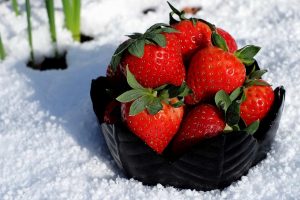Eating Raw Fruits During Winter

Winter may be a challenging time to follow raw vegan or fruit based diets. Most fruits and raw vegetables have a cooling effect in our bodies. Think of watermelons, cucumbers, apples and tomatoes. These are all fruits we are likely to enjoy on a hot summer day, but not so much on a snowy winter night.
However, not all fruits and vegetables have a cooling effect. According to Ayurveda and Traditional Chinese Medicine, dates have a warming effect. Other fruits like lemons may have a cooling effect, but they are still recommended to consume during winter, given their ability to ease illness, such as the common cold.
As a rule of thumb, during winter, we prefer to eat more warming foods and less cooling foods. The most cooling fruits include apples, bananas, grapefruit, kiwis, lemons, oranges, pear, persimmons, strawberries, and watermelon. Warming fruits include cherries, dates, coconut water, guavas, mangos, nectarines, peaches, and raspberries. Neutral fruits include apricots, figs, goji berries, grapes, olives, papayas, pineapples, and plums.
Another beautiful option during winter is to eat gourds, such as squash. Many people fail to notice, squashes are fruit, they all contain seeds inside, just like cucumbers and tomatoes. Most gourds, however, are impossible to eat raw, that is why we need to cook them, which can be done under 48°C, but takes a longer process and goes against being truly raw. That being said, I find it to be a beautiful addition that allows people to eat nothing but raw local fruit all year round, even in cold climates such as those in Colorado.
Previous Section:
Acknowledgments
Next Section:
Acknowledgments


